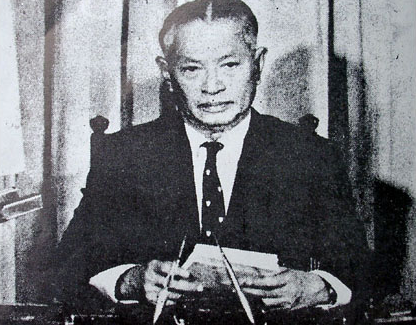Thailand ~ National Anti-Corruption Commission (NACC)
- Mon, 3 April 2023

The prevention and suppression of corruption and misconduct in the civil service in Thailand has been in the past since the Sukhothai period. Ayutthaya period Krung Thonburi period Rattanakosin period to the present day by the beginning of the present era It started with the enactment of laws related to the prevention and suppression of corruption, namely the Criminal Law R.E. 127, the Judiciary Act, B.E. 2471, the State Audit Commission Act, B.E. and municipal employees who offend or incompetence, B.E. 2490, Complaints Act, B.E. 2492
Later, in the year 1951, the People's Action Committee (NACC) was established to accept complaints and develop it into the Department of State Audit in the year 1953, but was Dissolved in the year 1960 and the Audit Committee on Taxation (Por.Tor.Por.) was established under the Act on Examination of Tax Practices. and Other State Revenues, B.E. 2503 (1960)
After the revolution on November 17, 1971, the administrative rules of the country were revised. to achieve flexibility in management Reducing redundant work by including the work of the Police Department, the Office of the Complaint Committee and the work of the Inspector General of the Office of the Prime Minister. together and forming the Office of the Commission on Examination and Follow-Up of the Performance of Government Services (Kor.Tor.Por. ) According to the Announcement of the National Executive Council No. 314 dated December 13, 1972, it is responsible for inspecting and monitoring the implementation of laws, regulations, plans and policies of the government, including investigating corruption. and misconduct But when the great democracy event in history of students students and people of various professions on October 14, 1973, although the outer image may be seen as a request for the restoration of the constitution of democratic rule But in the depths is something that cannot be denied that The problem of corruption in government circles in the political elite was a major catalyst for the widespread protests of that time. Because when there is a sign that the sovereign power has returned to the Thai people Events calling for democracy began to subside. People have the opportunity to call on the government to seriously prevent and suppress corruption. As a result, the O.T.P.A. office had to be dissolved.

Sanya Thammasak, Prime Minister
delivered a speech on television at the Chitralada Library Building
The night of October 14, 1973
When Sanya Thammasak became Prime Minister has considered and acted upon such request This has appeared in the order of the Prime Minister No. 113/2517 dated May 2, 1974 that directly to the Prime Minister and the Office of the Prime Minister And there are always claims that there is corruption and misconduct in the government circle. which in some cases involves government officials from many ministries, bureaus, departments or state enterprises. This government has the intention that must prevent and suppress corruption and misconduct in official circles to be eradicated or at least alleviated.” Therefore, the National Anti-Corruption and Misconduct Commission was appointed by virtue of Article 9(6) of the Announcement of the Revolutionary Council No. 218, dated 29 September 1972, with the Prime Minister as the chairman. but not before starting to operate Mr. Sanya Thammasak had resigned from the position of Prime Minister first. After that, upon receiving His Majesty's kindness, he appointed him Prime Minister again. The Anti-Corruption Commission was revised and began operating on July 2, 1974. Shortly thereafter, the Anti-Corruption and Misconduct Act B.E. 1975 on March 3, 1975 and the enactment of the Act Amending the Announcement of the Revolutionary Council No. 216 dated 29 September 1972 (No. 10) B.E. under the Office of the Prime Minister
When the Constitution of the Kingdom of Thailand B.E. called the National Anti-Corruption Commission. There is the Office of the National Anti-Corruption Commission as an administrative unit. that is independent in personnel management, budgeting and other operations
Later, on November 17, 1999 (the Organic Act B.E. On the prevention and suppression of corruption, 1999, published in the Government Gazette, Volume 116, Part 114 Kor, dated 17 November 1999), as a result, the Office of the Anti-Corruption Commission was dissolved. and was established as the Office of the National Anti-Corruption Commission, abbreviated as the "Office of the NACC".
The promulgation of the Constitution of the Kingdom of Thailand, B.E. 2550, which still prescribes that the National Anti-Corruption Commission is an independent organization according to the Constitution and shall have powers and duties in addition to what was previously provided in the Constitution of the Kingdom of Thailand, B.E. 2540. The important thing is to have the powers and duties to regulate the morals and ethics of those holding political positions as well. to comply with the provisions of the Constitution In the Organic Act on the Prevention and Suppression of Corruption B.E. 2542 (No. 2) B.E. and increase operational efficiency In addition to what is stipulated in the Organic Act on the Prevention and Suppression of Corruption B.E.
- Promoting the prevention and suppression of corruption, such as the protection of witnesses or testimony, the provision of bribes, rewards or any other benefits. with those who give statements or those who give clues or any information about corruption Recognizing and protecting government officials who report or provide information about corruption Keeping the accused and related persons as witnesses requiring government agencies to disclose procurement information Addition of rules and procedures for filing an account showing a list of assets and liabilities including fact-checking and the inquiry process of the NACC to make it clearer and more efficient.
- Establishment of provincial anti-corruption committees to recruit good people There are morals and ethics in each province to carry out anti-corruption work. According to the law, the provincial anti-corruption committee has begun. after the date of enactment of the law The new NACC has already been established for 2 years. In this regard, the NACC Office has already established provincial NACC offices in all 76 provinces.
Vision
To be a leading organization in solving corruption problems with efficiency, transparency and credibility.
Mission
1. Integrate cooperation with all sectors in pushing forward the prevention and suppression of corruption.
2. Building a culture of honesty in Thai society
3. Develop measures and mechanisms to prevent and suppress corruption.
4. Aiming to be a moral organization, adhering to principles of honesty, fairness, professionalism.
5. Continuously monitor and evaluate the achievements.
Duties and powers of the Office of the NACC.
According to Sections 141 and 142 of the Organic Act on Anti-Corruption B.E. It is a government agency and has the status of a juristic person. Accountable directly to the NACC, with duties and powers as follows:
- responsible for administrative work and take action to enable the NACC to accomplish its missions and duties as stipulated in the Constitution. This Organic Act and other laws
- facilitating, coordinating, cooperating, promoting and supporting the performance of the NACC and commissioners;
- to coordinate and cooperate internationally in relation to the prevention and suppression of corruption;
- to carry out or arrange for the collection, analysis, study, research and dissemination of information and knowledge concerning corruption and misconduct and the dangers of corruption and misconduct both in the public and private sectors;
- to promote and support people to come together to participate in knowledge campaigns; Resist or point a clue according to the mechanism prescribed by the NACC under section 33.
- to give advice and advice to government agencies; government agencies, state enterprises or local government or government officials or the private sector regarding the prevention and suppression of corruption
- establishing an information system relating to matters pending the operation of the NACC. which must at least specify the responsible person and the progress of the implementation of each matter. so that the directors can check at any time
- to perform other acts as entrusted by the NACC and as provided by law.
Source ==> National Anti Corruption Commission
Website Link ==> Thailand (NACC)







/Russia%20(6-6-2025)/1st%20Place%20-%20Russia“We%20say%20NO%20to%20corruption!”-80x80.jpg)

/001-80x80.jpg)

/3-80x80.JPG)